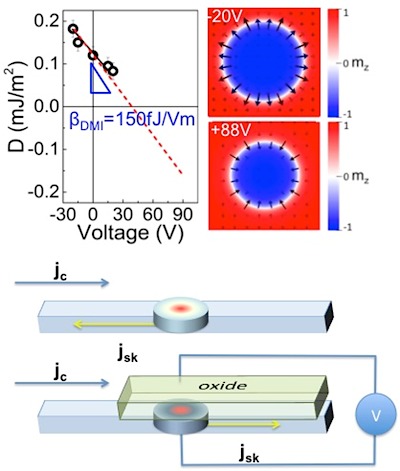A very exciting field of research has recently been devoted to magnetic skyrmions: they are potential candidates to overcome the power consumption problems of the conventional microelectronic Von Neuman architectures where memory and logic functions are physically separated. Thanks to their small size, high mobility under current, they have been proposed to be used in combined logic and memory devices that would reach ultra-low power, scalable, high-speed and high-density. Morevoer, due to their specific particle-like behavior, they have even been envisioned as potential candidates for neuromorphic applications.
These magnetic skyrmions are stabilized by an antisymmetric magnetic exchange interaction called Dzyaloshinskii-Moriya interaction (DMI) that favors the occurrence of non-colinear spin textures. In thin film multilayers such as heavy metal/ferromagnet/metal oxide, the stability of skyrmions is very sensitive to all magnetic parameters, in particular magnetization, magnetic anisotropy, magnetic field and also DMI.
Finding a well-controlled local, dynamic and reversible method to tune DMI and thus skyrmion properties would be a technological breakthrough for using these topological solitons in efficient, fast, reliable and versatile spintronic devices. Our goal in this ANR junior researcher grant is to demonstrate that this control can be achieved using gate voltages. The main objectives of ADMIS project thus are:
- To better understand the origin of DMI in heavy metal/ferromagnet/oxide ultrathin trilayers, and in particular to study its dependence on the oxide, oxidation state of ferromagnetic /oxide interface and its sensitivity to electric fields.
- To reach a local reversible or irreversible control of DMI value and in particular of its sign by the application of gate voltages
- To investigate the effect of DMI change on current-induced domain wall and skyrmion motion
- To study and implement in devices the electric field control of DMI for local and either volatile or remanent DMI control, for pre-programmable or reprogrammable local DMI state for either memory/logic or for bio-inspired devices.
Contact: Hélène BEA, from the sensors team.





